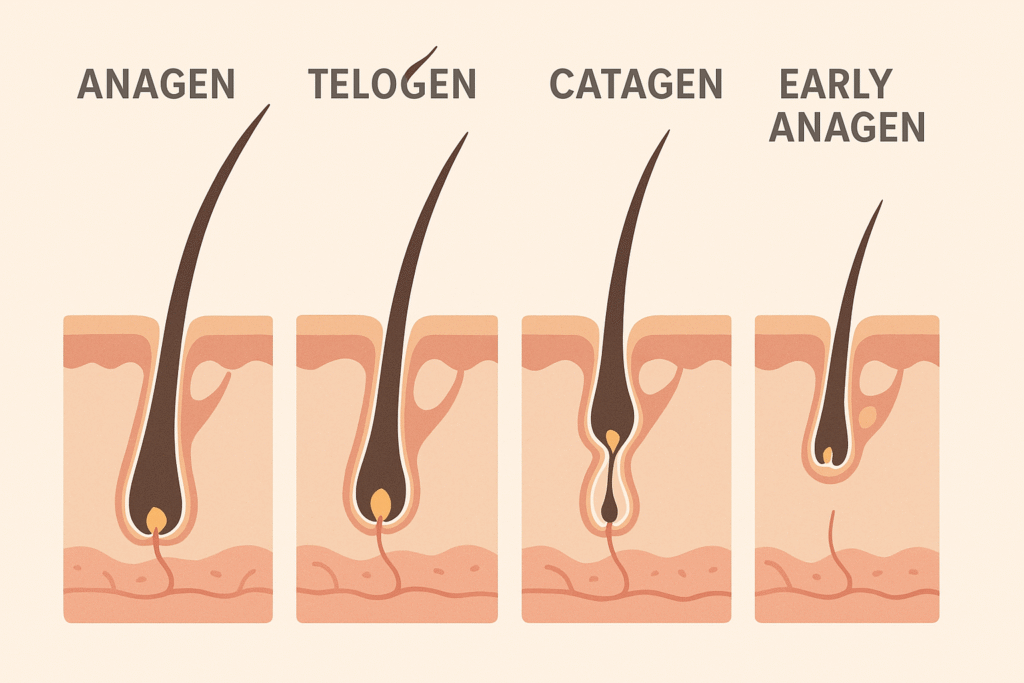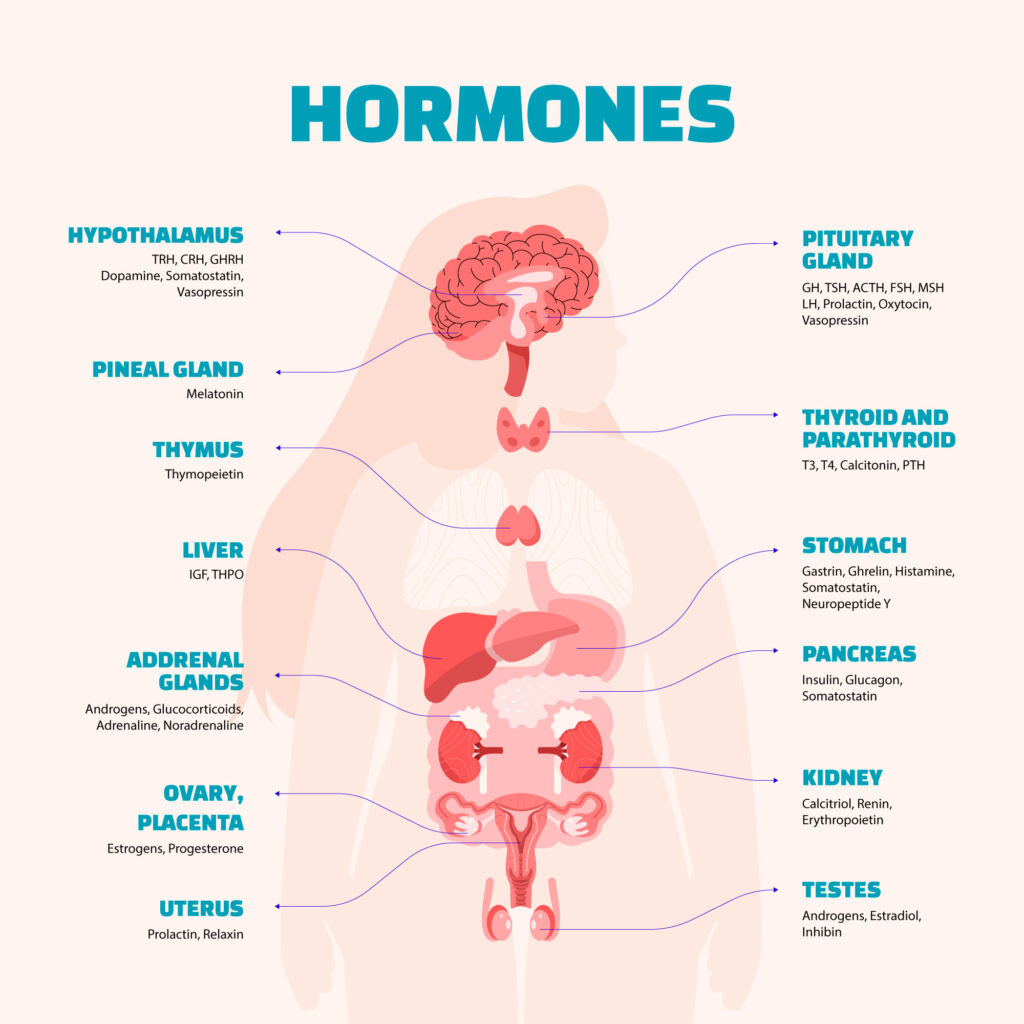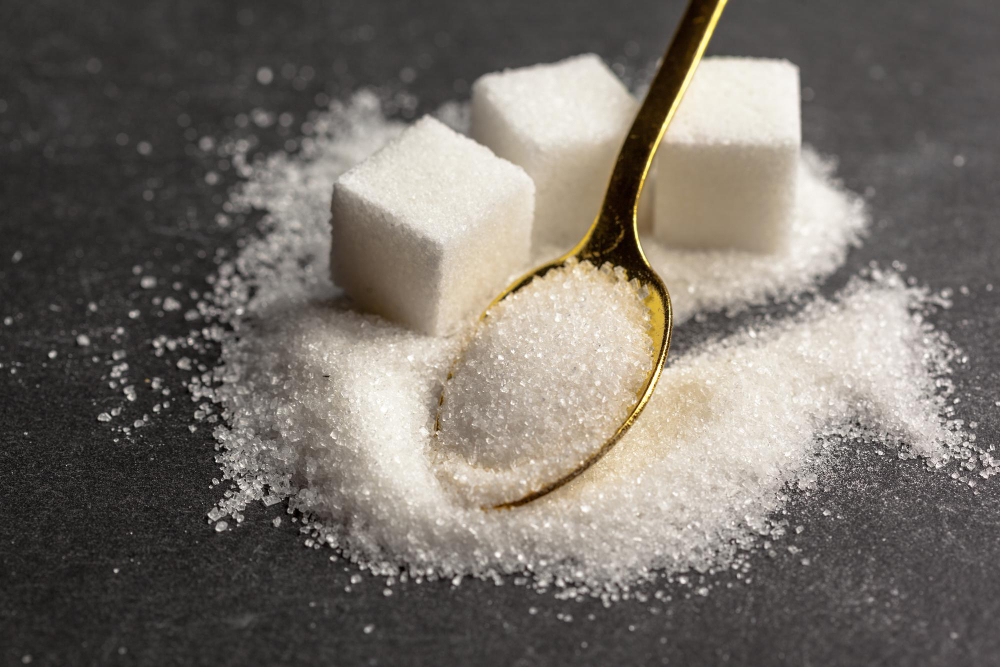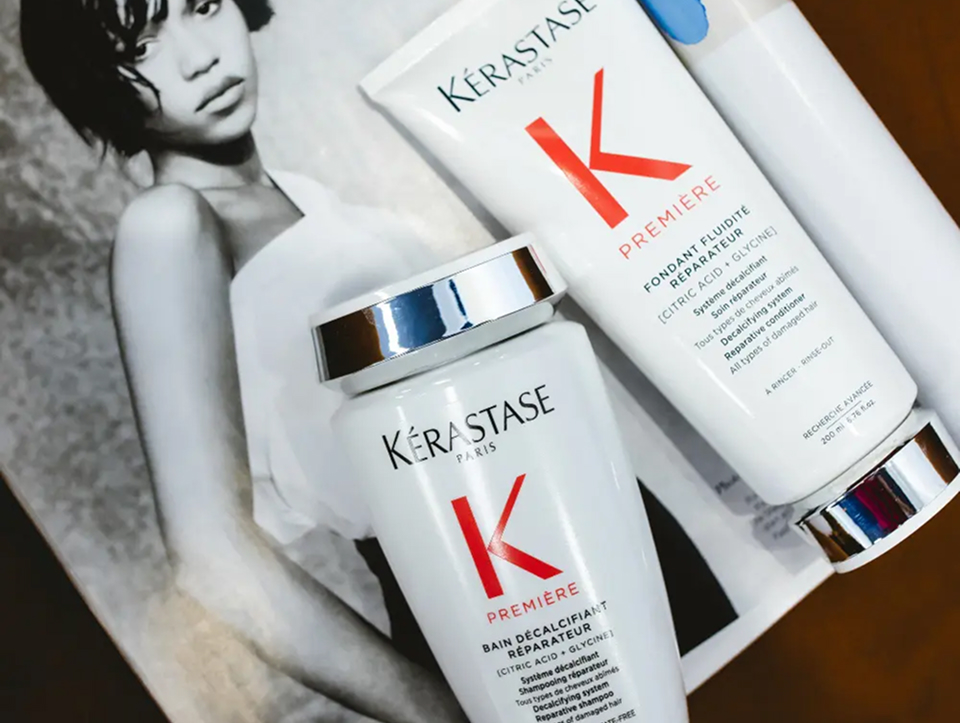One common concern at our hair and scalp spa in Boston is hair loss, which affects people of all genders and ages.
While genetics, hormonal changes, and lifestyle habits play significant roles in hair thinning, research shows that diet—particularly sugar intake—can significantly impact hair health.
In this article, we’ll explore the connection between hair loss and sugar, explain the role of the hair growth cycle, and provide practical steps to protect and restore healthy hair.
Understanding the Hair Growth Cycle

Your scalp contains approximately 100,000 hair follicles, each undergoing a continuous cycle of growth and rest. This cycle includes three main phases:
- Anagen (Growth Phase): Active hair growth lasting several years.
- Catagen (Transition Phase): A short period when growth slows, and follicles shrink.
- Telogen (Resting Phase): Hair rests before shedding naturally.
Healthy hair depends on a balanced growth cycle, which can be disrupted by stress, hormones, and diet—including high sugar consumption.
🌿 Related Reads: What is Hair Loss? l How Your Diet Affects Your Scalp Health
Does High Sugar Intake Cause Hair Loss?
Yes. Consuming large amounts of sugar can accelerate hair thinning, especially if you are genetically predisposed to pattern baldness. Here’s how sugar affects your hair:
1. Sugar Disrupts Hormone Balance

Refined sugar in processed foods and sweetened beverages causes spikes in blood glucose. Your body responds with insulin surges, which can disrupt hormone balance—particularly androgens like DHT (dihydrotestosterone). Elevated DHT shrinks hair follicles, leading to androgenic alopecia (pattern hair loss).
📚 Research also shows that when blood sugar levels remain stable, this can lead to insulin resistance, causing your body cells to respond less effectively to insulin.
2. Sugar Triggers Inflammation and Oxidative Stress

Here is another reason hair loss and sugar are linked: Excess sugar can activate inflammation in your body and scalp. Chronic inflammation damages hair follicles, while free radicals generated by sugar metabolism contribute to oxidative stress, further weakening hair strands.
3. Sugar Crowds Out Nutrient-Dense Foods
A diet high in sugar often lacks essential nutrients for hair health:
- Biotin – supports keratin production
- Iron, Zinc – necessary for follicle health
- Vitamins A, C, E – antioxidant support and scalp nourishment
Without these nutrients, follicles cannot thrive, resulting in hair thinning and loss.
🌿 Worthy Reads: Healthy vs Unhealthy Scalp l 7-Day Scalp Detox Routine
Can Hair Loss from Sugar Be Reversed?
When it comes to hair loss and sugar, and if it can be reversed, the good news is yes, but it requires dietary and lifestyle changes:
Reduce Sugar Intake
- Avoid sugary drinks, candies, and processed snacks.
- Check labels for sucrose, high-fructose corn syrup, and dextrose.
Choose Nutrient-Rich Foods
- Include whole grains, fruits, vegetables, nuts, and lean proteins.
- Vegetables slow the absorption of sugar and provide fiber, water, and essential nutrients.
Healthy Sugar Alternatives
- Use maple syrup, stevia, or honey in moderation.
Support Your Scalp
- A balanced diet, combined with professional scalp treatments at our Boston spa, can restore a healthy environment for hair growth.
Key Vitamins and Minerals for Hair Growth

When it comes to hair loss and sugar there are several vitamins help promote healthy hair growth, but here are the essential ones available in the table below:
| Nutrient | Role in Hair Health |
|---|---|
| Vitamin C | Antioxidant, supports collagen, enhances iron absorption |
| Vitamin E | Improves scalp circulation, protects follicles from oxidative damage |
| Biotin & B-Vitamins | Essential for keratin production and follicle health |
| Vitamin D | Stimulates follicle growth |
| Vitamin K | Supports calcium transport for follicles |
| Iron | Delivers oxygen to follicles; deficiency can cause thinning |
| Zinc | Maintains follicle health, strengthens strands |
| Selenium | Protects follicles from oxidative damage |
| Magnesium | Helps absorb and utilize other essential nutrients |
| Copper & Silica | Strengthen hair, support melanin production, and collagen formation |
| Calcium & Potassium | Promote nutrient transport and scalp health |
| Iodine & Manganese | Regulate thyroid function and enzymes essential for hair growth |
Practical Steps to Reduce Hair Loss from Sugar
- Start meals with vegetables to stabilize blood sugar.
- Limit processed snacks and sweetened beverages.
- Incorporate whole grains, fruits, and protein-rich foods.
- Consider a scalp consultation in Boston to create a personalized treatment plan.
- Track progress—hair growth improvement can be noticeable in 1–3 months with consistent changes.
The Link Between Hair Loss and Sugar
The connection between hair loss and sugar sheds light on the relationship between diet and hair health. Consuming excessive sugar can lead to insulin resistance, which in turn results in inflammation and oxidative stress, the primary causes of hair loss.
Changing your diet and reducing your intake of refined sugar can create a healthy environment for hair growth. You can regain your lustrous strands and have a healthy scalp with the correct diet and proper hair care.
Still, once you start making those small changes and notice hair thinning, visit us for a scalp treatment for hair loss to help treat your scalp while adjusting your diet.
It is an effective way to ensure your hair grows healthy and strong.
FAQ
How does a high sugar intake contribute to hair loss?
Consuming high amounts of sugar leads to increased insulin resistance, increased androgen levels, and increased hair follicle binding. Once the follicles weaken, hair thinning and loss result.
Can reducing your sugar intake help improve hair health?
Yes, reducing your sugar intake can help prevent hair thinning and loss. We recommend a balanced, nutrient-rich diet that includes healthy fats, vitamins, minerals, and protein, along with a scalp treatment for hair loss.
Is the natural sugar from fruits harmful to hair health?
The natural sugars in fruit are less harmful to your hair than processed sugars in sodas and candy. It can promote healthy hair growth when taken in moderation as part of a balanced diet.
How does sugar-induced inflammation affect your hair follicles?
Consuming excessive sugar triggers inflammation in the body and scalp, damaging the hair and disrupting the normal hair growth cycle. This can lead to hair shedding, thinning, and loss.
Will cutting back on sugar help hair grow back faster?
Reducing sugar creates a healthier environment for hair follicles, which can improve regrowth over time when paired with proper nutrition and scalp care.








